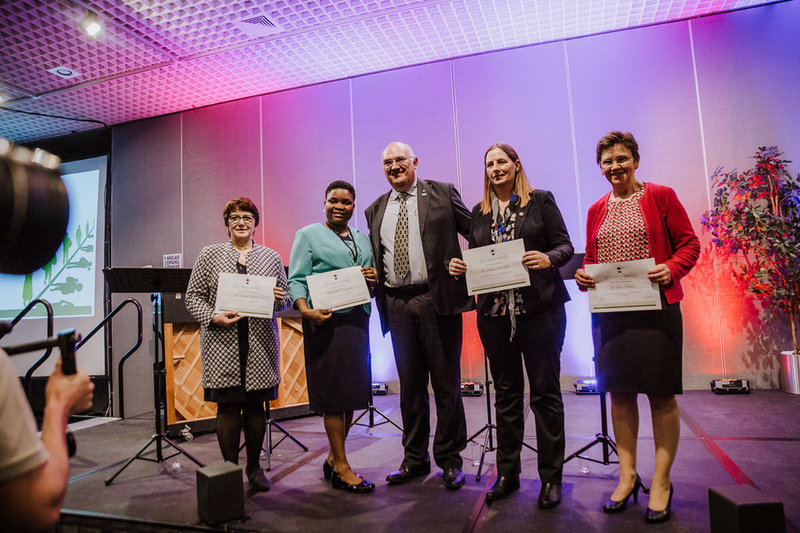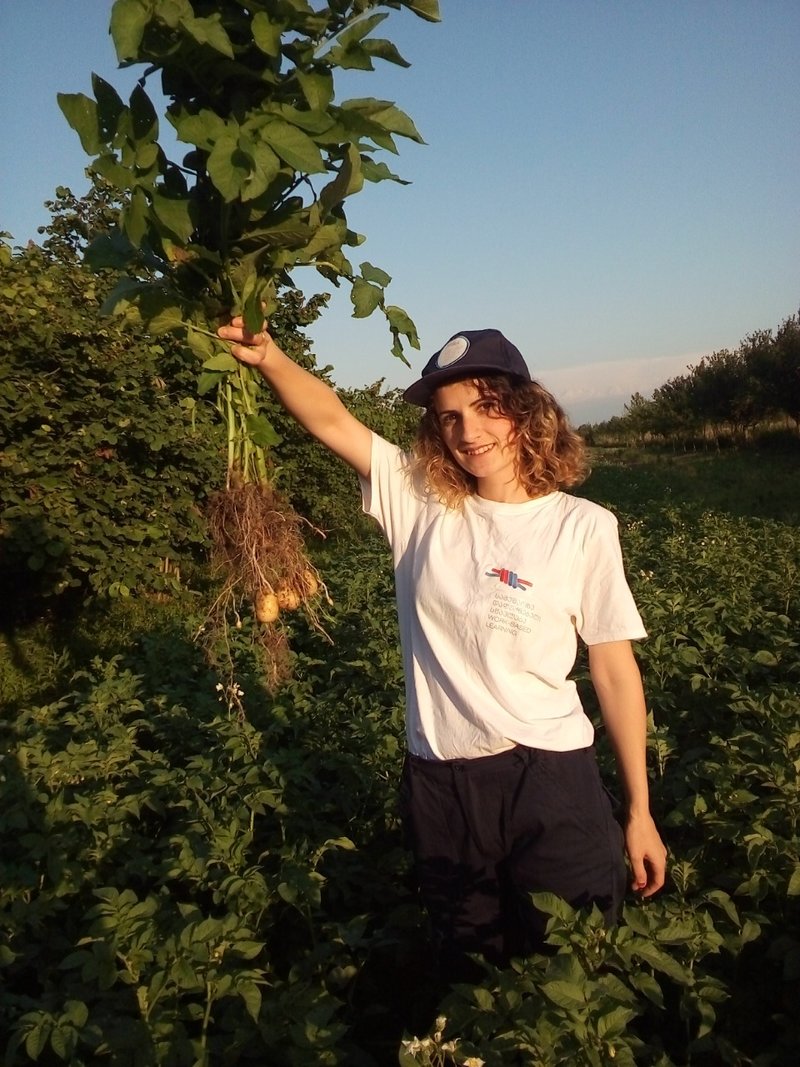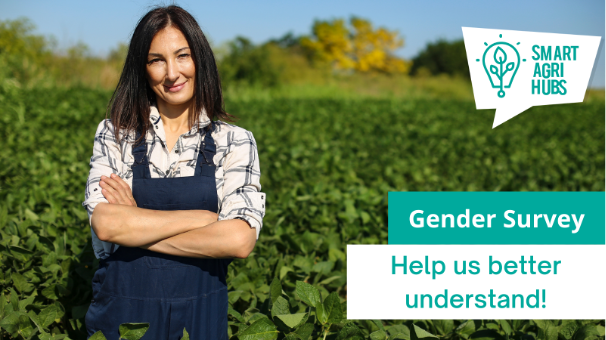Taking stock
You might wonder if this newsletter is still necessary in this day and age. Well, it is! Our friends at DEMETER will tell you why, and what they do in ‘Promoting a gender-inclusive value chain in the agricultural sector’.
And when you get to the end of their article, don't forget to do your part and fill out the Gender Survey!

DEMETER – Promoting a gender-inclusive value chain in the agricultural sector
What is DEMETER all about?
The DEMETER project is a large-scale deployment of farmer-driven, interoperable, smart farming-IoT (Internet of Things) based platforms. Twenty pilot projects or use cases are running in 18 countries to demonstrate and evaluate how innovations and extended capabilities benefit from interoperability mechanisms. Alongside this work, DEMETER is actively promoting the importance of a gender-inclusive value chain in the agricultural sector. This firstly includes attracting more women to agriculture, but also ensuring that women are represented at the policy table, the research table and the technology table.
Gender differences expressed in numbers
The figures are well-known; only 28.7% of farm managers in Europe are women (Eurostat, 20161). Tech companies that are venture-backed and with all-male founding teams receive 93% of the capital invested, compared to 2% of funding going to all-female teams (Atomico, 20222). We also know that women have a lower adoption rate of agricultural technologies than men. The research tells us however that this is not down to gender but to gender-differentiated factors such as women owning smaller farms than men, having less access to capital, labour and resources and traditionally affected by societal land transfer practices. The disparity in equality is evident.
DEMETER's approach to tackle gender inequality
To help spotlight and tackle these issues, DEMETER has taken several different approaches. Within the project, approximately 40% of the leadership positions are held by women. This includes Work Package Leads, Task Leads, Pilot Leads and overall project management. Women are also active participants in the pilot projects. For example, Katarina Pavicevic is an Associate for fruit growing at Plantaze and participating in the DEMETER pilot focused on Disease Prediction and Supply Chain Transparency for Orchards/Vineyards. Speaking about her work, Katarina said, “The use of digital technologies can help to address many of the challenges facing the agriculture sector. Promoting gender equality in agriculture, agritech and ag-research is critical to encouraging more females in the field”.
We have hosted several events discussing gender inequality in agriculture and the challenge of attracting more women and young people to farming. For example, we held a webinar in association with SmartAgriHubs on International Rural Women’s Day in October 2021. Prominent professionals representing farmers, farmer organisations, technology and innovation projects analysed the current status of the gender gap in the agritech sector. At the event, Dr. Doris Marquardt of the European Commission, in the Directorate-General for Agriculture and Rural Development posed an interesting question; “What would a digital decade look like with women in the driving seat?”. Another event we ran in February 2022, again with SmartAgriHubs, focused on the ‘Changing Face of Agriculture’. The event was divided into two sessions; first hearing directly from farmers about their experiences and second, learning what supports and training are available from farmer organisations, farm advisors and Digital Innovation Hubs. A follow-on report is being prepared to further discuss the current state of play and recommendations on how a more gender-balanced sector can be achieved. Furthermore, in DEMETER, we have highlighted many positive news stories in our newsletters and on our website related to women working in agriculture including farmers, farm advisors, technology providers etc. For example, we recently featured a blog post from our partners, the Georgian Farmers’ Association (GFA), who have developed many initiatives supporting women in agriculture.
From the policy side, the World Farmers’ Organisation (WFO) are a member of the DEMETER consortium and have been extremely active in empowering women in agriculture. We have worked closely with them on DEMETER events and publications to ensure that the voice of women is heard, not only from Europe but from around the globe. Maria Giulia De Castro, Advocacy Policy and Partnership Officer at the WFO explains about the work they are doing.
“In 2013, the WFO established a Women Committee composed of members from all the six WFO Constituencies (North America, Oceania, Asia, Europe, Africa, Latin America). This committee meets to discuss women farmers’ issues in their respective constituencies as well as finding and sharing a common global vision when WFO is called to represent the global farmers’ community in agriculture-related international policy processes (i.e. United Nations Decade of Family Farming 2019-2028, Committee on the Status of Women (CSW), High-Level Political Forum(HLPF)). Also, to strengthen women farmers’ advocacy at all levels, the WFO General Assembly in 2013 adopted a policy document on Women which contained the vision, needs, challenges and calls for action collected by WFO members back then. After a few years, as the world changes, a few months ago, at the last WFO GA in Budapest, all WFO members came together to discuss and adopt a revised and updated policy document to promote women empowerment, enhancing women farmers’ role in the farming sector and eliminating social, cultural and economic barriers that prevent women from fully pursuing their objectives both in their personal and working life.”
This work by the WFO is crucial to ensuring women are better represented and heard.
From a technology perspective we have tried to ensure that females are represented in the DEMETER project. In our Open Calls, we have implemented a gender policy where successful applicants must indicate the measures that they are taking to support gender equality. For example, one of the winners of our 1st Open Call, DEVELOP, is Deep Planet where two of the three co-founders are female. Deep Planet apply scientifically proven research in AI to help growers and winemakers to make better farming decisions.
Finally, from a research perspective, we have many female researchers actively undergoing research in DEMETER at a PhD level, post-doctorate and more advanced level. It is important that their experiences are listened to and supported. We know that women are still under-represented in research and innovation. While there is gender balance at undergraduate and graduate level, women only hold 22% of doctoral graduates in ICT (She figures, 20213). Highlighting females’ research efforts, publications, and research areas of interest can help to raise the profile of the work being undertaken and encourage upcoming researchers.
Although DEMETER is a project focusing on the digitisation of the agrifood sector, we also have a responsibility to act as ambassadors for change and encourage a more inclusive value chain. Project-wide, we will continue to work on initiatives to support this.
1 Eurostat
2 Atomico
The rate of woman farm managers in Europe is about 29%
29%

Women own smaller farms than men, have less access to capital, labour and resources and are traditionally affected by societal land transfer practices.
All-female founding teams receive 2% of the capital invested
2%
"Especially in digital farming a proper knowledge transfer system is a cornerstone for a fruitful digital transformation."
93%
Tech companies that are venture-backed and with all-male founding teams receive 93% of the capital invested
"The use of digital technologies can help to address many of the challenges facing the agriculture sector. Promoting gender equality in agriculture, agritech and ag-research is critical to encouraging more females in the field." - Katarina Pavicevic


De Gender Survey: make your voice heard!
To better understand the situation of men and women in agriculture and smart farming, the Gender Taskforce of SmartAgriHubs has created a “Gender Survey”.
By completing this survey, you help us to build a deeper analysist and better communication tools for all genders. This survey is open to all ages, genders and to participants beyond the SmartAgriHubs community! If you have already filled it in, make sure to share it with your friends and colleagues.

Contribute today!
Click here
